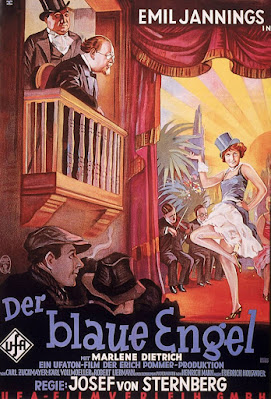Author's Note: This review is for the German version.
Decadence was never so decadent as that of Weimar Germany, but with Marlene Dietrich as the seductress, I can see how even the most moral of men could fall. The Blue Angel is a star-making turn for our Teutonic goddess as well as an excellent showcase for the man who would ultimately end up going from star to costar.
Strict, moralistic Professor Immanuel Rath (Emil Jannings) is appalled that some of his students have been frequenting the seedy Blue Angel Club. The miscreants, however, do not care what he thinks or even for him, giving him the pun name of "Unrath" (or "Garbage"). Determined to catch them at the club, he visits The Blue Angel.
There, he meets the alluring chanteuse Lola-Lola (Dietrich). It isn't long before he too falls under her spell, where a little Falling in Love Again so overpowers him that he gives up his respectable life to marry our siren. However, rather than him bringing her to his world, she takes him into hers. He starts by selling erotic postcards of his wife, then by being a literal clown in the cabaret show. Lola-Lola soon turns her wandering eye to Mazeppa the Strong Man (Hans Albers) as her husband becomes the stooge for Kiepert (Kurt Gerron), the magician and cabaret show impresario.
Things take a horrifying and tragic turn when the troupe returns to the Blue Angel Club. There's a sellout crowd to see the good professor at his lowest point. This ultimate humiliation drives him insane, causing tragedy for himself.
There is no greater fool than a fool in love, and The Blue Angel chronicles this axiom quite well. As much as I have been told this is a commentary on bourgeois hypocrisy, I do not see it that way. Rather, for me The Blue Angel is about a man who is so rigid in his worldview that he cannot sustain it when something that challenges it comes along.
I found Professor Rath to be stiff but not a monster. Instead, he is a pathetic figure, one who has suppressed his passions for so long beneath the guise of morality and intellect that he soon became lured into Lola-Lola's world.
Emil Jannings specialized in once-proud men who fall into desolation and disgrace: The Last Command, The Last Laugh, the now-lost film The Way of All Flesh. Jannings' performance can come across as a bit exaggerated as the acting styles shifted from silent to sound, but he also played the part correctly. He starts out stiff and rigid, and his descent into despair comes slowly and sadly. The shock he displays at his ultimate humiliation before his hometown crowd is deeply moving, and you feel great sadness for how he low he has fallen. Rath struck me as more moralistic than prudish, so his fall was not to my mind hypocritical as it was an outlet for his self-imposed repression.
While The Blue Angel was meant as a vehicle for Jannings, it is Dietrich who steals the show as our temptress. The film made Dietrich both a star and icon, the decadent siren of carnal pleasures. It is interesting to see her early on, her voice not yet having that rich, husky manner. Dietrich's Lola-Lola is her own woman, casual with men, one who does not mind playing with them if it amuses her. Whether it is telling one of her school suitors "Cut the English nonsense" when he speaks "I love you" (the little English used in the film) or behaving almost like a respectable hausfrau to her stuffy professor, Dietrich's character is cool to her men.
She sings what would become a signature song, Falling in Love Again, twice in The Blue Angel, but it is to her credit as an actress and von Sternberg's as director that both versions reveal Lola-Lola's character. The first time she is coyly flirtatious veering on amused, the second time there is a sharpness, a bitterness to her declaration that she "never wanted to" fall in love but "I can't help it". It is nice to see Marlene Dietrich before she became "DIETRICH", where she was still raw. You do not like her manner with Rath, yet you do believe that for a brief moment she could love someone like him.
The Blue Angel even has a bit of German expressionism when Rath wanders through the streets. Von Sternberg manages to sneak in little bits of humor in the film, such as when Rath and a student struggle with the English word "the".
This chronicle of a stiff but not bad man's fall to the demimonde of desire is a well-acted, well-directed film. It is clear why audiences fell for The Blue Angel, and why even after all these years people are still falling in love again with Marlene Dietrich.



No comments:
Post a Comment
Views are always welcome, but I would ask that no vulgarity be used. Any posts that contain foul language or are bigoted in any way will not be posted.
Thank you.